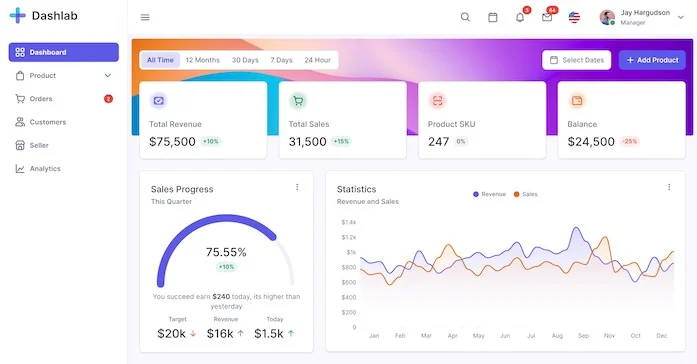In today’s digital era, businesses across different industries are utilizing the ability of digital marketing to connect with their target audience, drive brand awareness, and ultimately accomplish their goals. The approach is more than a one-stop solution. Different industries require tailored strategies to reach and engage their unique customer base. That’s why in this blog, we will explore how to apply digital marketing for various industries and provide actionable insights to help businesses harness the true potential of digital marketing.
How investing in digital marketing provides competitive advantages
Investing in digital marketing has evolved from being an option to an absolute necessity in today’s fiercely competitive landscape. By harnessing the benefits of digital marketing strategies, businesses can effectively reach their target audience, foster brand growth, and achieve tangible business results across diverse industries. Let’s take a closer look at its advantages.
1. Expanded reach and engagement with a targeted audience
Digital marketing opens up new horizons for businesses, allowing them to extend their reach beyond traditional boundaries.
Utilizing online advertising platforms, social media networks, and search engine marketing, businesses can precisely target specific audiences based on demographics, interests, and behaviours. This approach ensures that marketing efforts connect with the right audience, increasing the likelihood of engagement and conversions.
Example: Imagine a retail clothing brand that harnesses digital marketing to reach fashion-savvy young adults through enticing social media advertisements. By doing so, they can broaden their audience and attract more website visitors, ultimately boosting sales.
2. Cost-effectiveness and measurable return on investment
Compared to traditional marketing methods, digital marketing offers cost-effective solutions with measurable outcomes.
Digital advertising platforms empower businesses to set budgets, monitor real-time ad performance, and make data-driven adjustments to optimize campaigns. This level of control and transparency enables businesses to make the most of their marketing budget and achieve higher returns on investment (ROI).
Example: Let’s consider a legal firm that runs targeted Google Ads campaigns to promote their services to individuals searching for specific legal terms. By closely monitoring the campaign’s performance, they can measure clicks, and conversions, and calculate the ROI generated from their digital marketing endeavours.
3. Boosted brand awareness and reputation
Digital marketing provides businesses with invaluable opportunities to build and fortify their brand identity.
By consistently engaging with the target audience across various digital channels, businesses can elevate brand awareness and recognition. Through compelling content marketing, active social media involvement, and effective online reputation management, businesses can shape a positive brand image and establish credibility in their respective industries.
Example: Imagine a healthcare provider that creates informative blog articles, shares educational videos, and actively interacts with patients on social media platforms. By consistently delivering valuable content and building trust, they can strengthen their brand reputation, positioning themselves as a trusted and knowledgeable source of healthcare information.
4. Refined customer targeting and personalization
Digital marketing empowers businesses to gain a deeper understanding of their customers and tailor marketing messages accordingly.
By analyzing data from website analytics, social media insights, and customer interactions, businesses can uncover valuable insights into customer preferences, behaviours, and purchasing sequences. Armed with this information, businesses can create personalized marketing campaigns that truly resonate with their target audience, leading to higher engagement and conversions.
Example: Let’s consider a tourism company that utilizes website analytics data to identify popular travel destinations and the preferences of its target audience. Armed with these insights, they can create personalized email campaigns or social media ads offering customized travel packages and recommendations, significantly increasing the chances of conversions.
5. Enhanced customer engagement and relationship building
Digital marketing provides businesses with a multitude of avenues to engage with customers and foster lasting relationships.
Through social media platforms, email marketing, live chat support, and personalized content, businesses can interact with their audience, address queries promptly, and provide exceptional customer service. This active engagement nurtures customer loyalty and encourages repeat business.
How to leverage digital marketing for different industries
Example: Picture a hospitality business that engages with its guests through personalized email campaigns, offering exclusive promotions and post-stay surveys. By actively listening to customer feedback and responding promptly, they can strengthen customer relationships, inspire positive reviews, and ultimately enhance customer satisfaction and loyalty.

Before diving into industry-specific strategies, it’s essential to understand the overarching principles of leveraging digital marketing across different sectors. Regardless of the industry, these fundamental steps remain essential:
1. Determine your audience
Acquire insights into your target audience’s preferences, demographics, and online behaviour by performing thorough market research. This information will inform your digital marketing strategies and help personalize your messaging to have a connection with your intended audience.
2. Set plausible goals
If you remember specific, measurable, achievable, relevant, and time-bound (SMART), establish these goals in your digital marketing campaign. Whether it’s increasing traffic, increasing conversions, or enhancing brand visibility, having clear objectives will guide your strategy and enable you to measure success effectively.
3. Establish a consistent brand presence
Develop a solid and cohesive brand identity across all digital platforms. Consistency in branding helps build trust and recognition among your target audience.
4. Utilize data and analytics
Leverage data-driven insights to make informed decisions. Monitor key performance indicators (KPIs) and use data analytics tools to better measure the efficacy of your digital marketing efforts. Tailor your data-backed strategies to perfect results.
Digital marketing best practices in different industries
Now, let’s explore industry-specific digital marketing strategies that can propel businesses forward:
1. Retail marketing
The retail industry thrives on creating a coherent and customized customer experience. To leverage digital marketing effectively, consider the following strategies:
- E-commerce optimization: Develop user-friendly and mobile-responsive websites with effortless navigation, quick loading times, and secure payment gateways. Enhance product descriptions and images to improve online visibility.
- Social media engagement: Use popular social media platforms to show off your products, engage with customers, and run targeted ad campaigns. Some businesses even let their customers help others with the proceeds going to charities like gift bags, shirts, beauty products, etc.
- Email marketing: Nurture customer relationships through personalized email campaigns, offering exclusive promotions, loyalty programs, and personalized recommendations.
2. Legal Marketing
The legal industry relies on establishing trust and credibility. To leverage digital marketing effectively, consider the following strategies:
- Content marketing: Create authoritative and informative content through blog posts, whitepapers, and legal guides. Place yourself as an adept in your practice area to attract potential clients.
- Search engine optimization (SEO): Optimize your website with relevant keywords, meta tags, and schema markup to improve organic search engine visibility. Focus on local SEO to target clients in specific geographic areas.
- Online reputation management: Track and manage online customer reviews and ratings to maintain a positive brand reputation. Encourage satisfied clients to provide testimonials or participate in various case studies.
3. Healthcare Marketing
In the healthcare industry, digital marketing plays a crucial role in educating patients and building trust. To leverage digital marketing effectively, consider the following strategies:
- Search engine marketing (SEM): Run targeted ads on search engines to increase visibility for healthcare services. Optimize landing pages for relevant keywords and ensure a seamless user experience.
- Influencer marketing and social media: Leverage social media platforms to provide valuable healthcare information, share patient testimonials, and collaborate with influencers to amplify your message.
- Telehealth and mobile apps: Embrace telehealth platforms and develop mobile apps to offer convenient healthcare access and enhance patient engagement in services for aged care, dental care, prenatal care, therapeutic care, etc.
4. Tourism marketing
The tourism industry relies heavily on inspiring travellers and providing memorable experiences. To leverage digital marketing effectively, consider the following strategies:
- Visual storytelling: Utilize visually captivating content, such as high-quality images, videos, and virtual tours, to showcase destinations and attractions.
- Social media listening: Track social media interactions to identify travel trends, preferences, and feedback. Engage with travellers, respond to queries, and provide personalized recommendations.
- User-generated content: Encourage travellers to share their experiences on social media, leveraging user-generated content as a powerful marketing tool. Run contests or campaigns to incentivize content creation.
5. Hospitality Marketing
The hospitality industry focuses on providing exceptional guest experiences. To leverage digital marketing effectively, consider the following strategies:
- Online reviews and reputation management: Monitor and respond to online reviews promptly, prioritizing guest satisfaction and addressing concerns. Encourage positive reviews and testimonials to build credibility.
- Localized SEO: Optimize your website and online listings for local search, targeting specific regions or neighbourhoods. Make sure that you have consistent and accurate business information across different directories.
- Personalized email marketing: Implement email campaigns to nurture guest relationships, share exclusive offers, and provide personalized recommendations based on preferences and past stays.
Digital marketing for your industry’s success
By understanding the unique needs and characteristics of different industries, businesses can leverage digital marketing to connect with their target audience effectively.
The strategies outlined above provide a starting point for creating impactful and tailored digital marketing campaigns in retail, legal, healthcare, tourism, and hospitality sectors. You can implement this kind of campaign or with the help of a digital agency. However, it’s essential to continuously adapt and optimize strategies based on customer feedback, evolving digital landscapes, and industry trends. Embrace the opportunities that digital marketing offers, experiment with different tactics, and remain committed to providing exceptional customer experiences.






